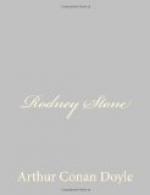Friar’s Oak is in a dip of the Downs, and the forty-third milestone between London and Brighton lies on the skirt of the village. It is but a small place, with an ivied church, a fine vicarage, and a row of red-brick cottages each in its own little garden. At one end was the forge of Champion Harrison, with his house behind it, and at the other was Mr. Allen’s school. The yellow cottage, standing back a little from the road, with its upper story bulging forward and a crisscross of black woodwork let into the plaster, is the one in which we lived. I do not know if it is still standing, but I should think it likely, for it was not a place much given to change.
Just opposite to us, at the other side of the broad, white road, was the Friar’s Oak Inn, which was kept in my day by John Cummings, a man of excellent repute at home, but liable to strange outbreaks when he travelled, as will afterwards become apparent. Though there was a stream of traffic upon the road, the coaches from Brighton were too fresh to stop, and those from London too eager to reach their journey’s end, so that if it had not been for an occasional broken trace or loosened wheel, the landlord would have had only the thirsty throats of the village to trust to. Those were the days when the Prince of Wales had just built his singular palace by the sea, and so from May to September, which was the Brighton season, there was never a day that from one to two hundred curricles, chaises, and phaetons did not rattle past our doors. Many a summer evening have Boy Jim and I lain upon the grass, watching all these grand folk, and cheering the London coaches as they came roaring through the dust clouds, leaders and wheelers stretched to their work, the bugles screaming and the coachmen with their low-crowned, curly-brimmed hats, and their faces as scarlet as their coats. The passengers used to laugh when Boy Jim shouted at them, but if they could have read his big, half-set limbs and his loose shoulders aright, they would have looked a little harder at him, perhaps, and given him back his cheer.
Boy Jim had never known a father or a mother, and his whole life had been spent with his uncle, Champion Harrison. Harrison was the Friar’s Oak blacksmith, and he had his nickname because he fought Tom Johnson when he held the English belt, and would most certainly have beaten him had the Bedfordshire magistrates not appeared to break up the fight. For years there was no such glutton to take punishment and no more finishing hitter than Harrison, though he was always, as I understand, a slow one upon his feet. At last, in a fight with Black Baruk the Jew, he finished the battle with such a lashing hit that he not only knocked his opponent over the inner ropes, but he left him betwixt life and death for long three weeks. During all this time Harrison lived half demented, expecting every hour to feel the hand of a Bow Street runner upon his collar, and to be




